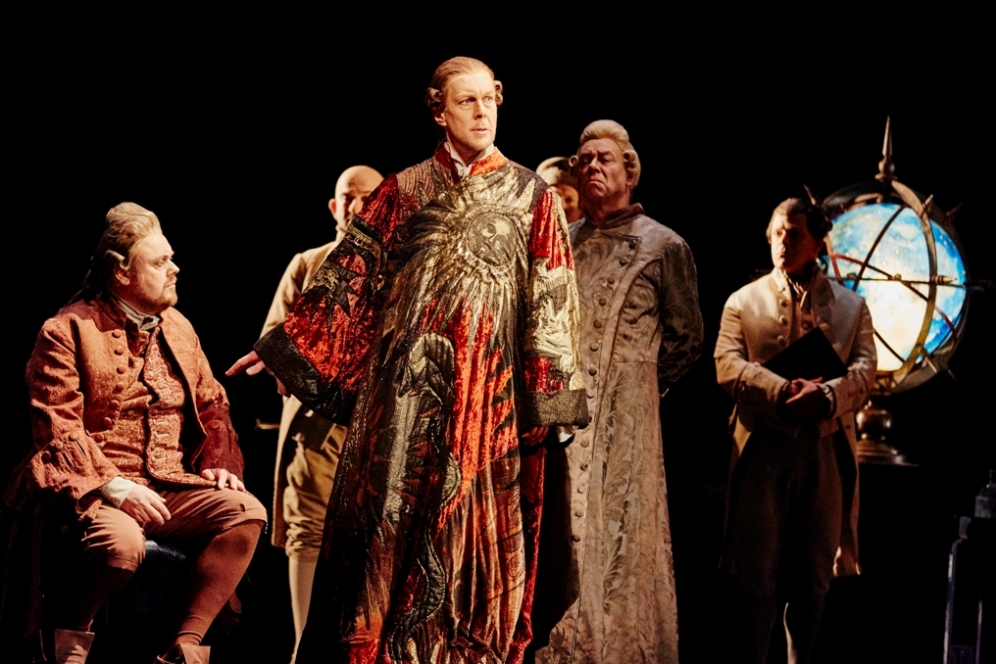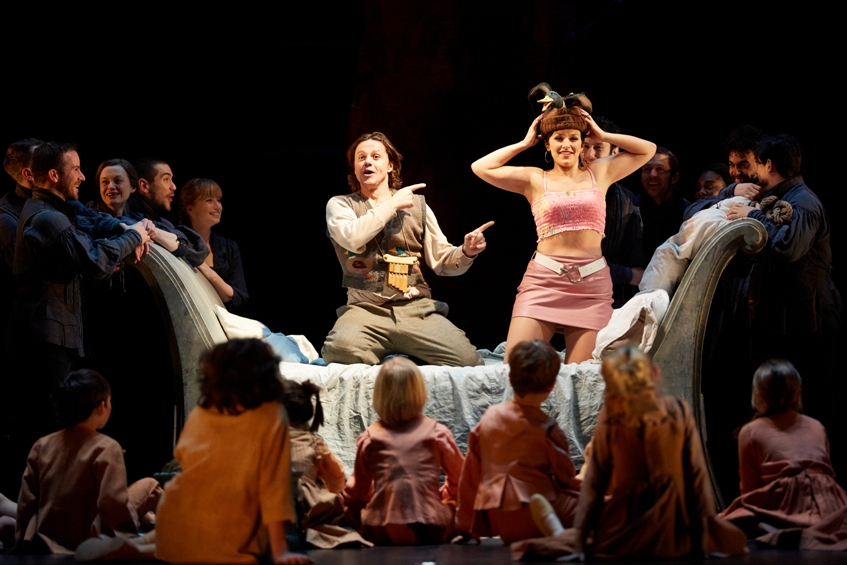Die Zauberflöte, Royal Opera | reviews, news & interviews
Die Zauberflöte, Royal Opera
Die Zauberflöte, Royal Opera
Young lovers, a comic turn and paternal priest triumphant in Covent Garden staple
Mozart’s The Magic Flute is one of those operas, like Verdi’s Il trovatore and all the mature Wagner masterpieces, which need a line-up of equally fine singers but rarely get it in the compromised world of the opera house.
Cornelius Meister led a game of two halves, less reliably so than Mozart in his mix of light and dark, with the Royal Opera Orchestra not always on top form. It may have been Meister’s insistence on little vibrato, period style, that robbed the strings of their warmth and vital singing quality. His first half rushed by, presumably adhering to the speedier spirit of Mozart’s age, but a top champion of authentic values like Sir Charles Mackerras would have given the singers more space to express their artistry at key points.

You knew that this Pamina was a girl destined to become a powerful woman from the strength of her calls for Tamino on her Act One adventure, and her gleaming utterance of “Die Wahrheit” ("The truth") when companion Papageno asks her what they should tell Sarastro. The scene of her attempted suicide pierced the heart, never mind a slip in the last few bars; let’s not forget the pitch-perfect projection of the Three Boys who stop her, last night Michael Clayton-Jolly, Matthew Price and Alessio Andrea, which was as good as it gets.
 As for the wondrous reunion with Tamino, it brought sublimity from both Karg and the apple of her eyes, handsome Pavol Breslik as a Tamino prone to convincing adolescent anger in the early stages of his development. They're a well matched pair, both with fast vibratos kept in check by superb musicianship. Unfortunately McVicar’s production didn’t help Karg (pictured above; no second-cast images available) with the feminist impetus she found in Pamina's journey: as Barbara Hendricks once told me, “she ends up leading him”, but in these feeble Trials of Fire and Water, she doesn’t (the movement group should also be told to stop gibbering and moaning over the flute solo; silent writhing would be more powerful). The opening-up of the sexist brotherhood to women thanks to Pamina's initiative isn't stressed clearly enough either, however promisingly set up
As for the wondrous reunion with Tamino, it brought sublimity from both Karg and the apple of her eyes, handsome Pavol Breslik as a Tamino prone to convincing adolescent anger in the early stages of his development. They're a well matched pair, both with fast vibratos kept in check by superb musicianship. Unfortunately McVicar’s production didn’t help Karg (pictured above; no second-cast images available) with the feminist impetus she found in Pamina's journey: as Barbara Hendricks once told me, “she ends up leading him”, but in these feeble Trials of Fire and Water, she doesn’t (the movement group should also be told to stop gibbering and moaning over the flute solo; silent writhing would be more powerful). The opening-up of the sexist brotherhood to women thanks to Pamina's initiative isn't stressed clearly enough either, however promisingly set up
Nothing impeded the simpler journey of birdcatcher Papageno in search of a wifey. Markus Werba, wielding authentic Austrian dialect, instilled confidence from the start as a virile rather than a childlike natural man. He had what presumably were his own gags, including a premonition of Beethoven’s “Ode to Joy” on the panpipes, supplying the missing notes with his voice. He’s also a nifty dancer, and the second engagement of his magic bells brought a nice touch from McVicar, the two pompous priests sent to guide him (Harry Nicoll and Donald Maxwell) breaking into steps at the pretty tune.

McVicar’s whole I’ve always find less convincing than many, despite some beautiful tableaux from genius John Macfarlane, sometimes at odds with old-fashioned follow spots on the singers and a space not quite filled by the performers. Some of us still want a bit more fantasy around the age of enlightenment and orreries. The cut-down dialogue was admirably delivered, though - three native German speakers among the leads certainly helped - and this is probably as strong a cast as the Royal Opera Magic Flute is going to get. That may well be true of the other team, led by Toby Spence and Janai Brugger, but this assembly is well worth catching in the next two performances.
rating
Explore topics
Share this article
The future of Arts Journalism
You can stop theartsdesk.com closing!
We urgently need financing to survive. Our fundraising drive has thus far raised £49,000 but we need to reach £100,000 or we will be forced to close. Please contribute here: https://gofund.me/c3f6033d
And if you can forward this information to anyone who might assist, we’d be grateful.

Subscribe to theartsdesk.com
Thank you for continuing to read our work on theartsdesk.com. For unlimited access to every article in its entirety, including our archive of more than 15,000 pieces, we're asking for £5 per month or £40 per year. We feel it's a very good deal, and hope you do too.
To take a subscription now simply click here.
And if you're looking for that extra gift for a friend or family member, why not treat them to a theartsdesk.com gift subscription?
more Opera
 La bohème, Opera North review - still young at 32
Love and separation, ecstasy and heartbreak, in masterfully updated Puccini
La bohème, Opera North review - still young at 32
Love and separation, ecstasy and heartbreak, in masterfully updated Puccini
 Albert Herring, English National Opera review - a great comedy with depths fully realised
Britten’s delight was never made for the Coliseum, but it works on its first outing there
Albert Herring, English National Opera review - a great comedy with depths fully realised
Britten’s delight was never made for the Coliseum, but it works on its first outing there
 Carmen, English National Opera review - not quite dangerous
Hopes for Niamh O’Sullivan only partly fulfilled, though much good singing throughout
Carmen, English National Opera review - not quite dangerous
Hopes for Niamh O’Sullivan only partly fulfilled, though much good singing throughout
 Giustino, Linbury Theatre review - a stylish account of a slight opera
Gods, mortals and monsters do battle in Handel's charming drama
Giustino, Linbury Theatre review - a stylish account of a slight opera
Gods, mortals and monsters do battle in Handel's charming drama
 Susanna, Opera North review - hybrid staging of a Handel oratorio
Dance and signing complement outstanding singing in a story of virtue rewarded
Susanna, Opera North review - hybrid staging of a Handel oratorio
Dance and signing complement outstanding singing in a story of virtue rewarded
 Ariodante, Opéra Garnier, Paris review - a blast of Baroque beauty
A near-perfect night at the opera
Ariodante, Opéra Garnier, Paris review - a blast of Baroque beauty
A near-perfect night at the opera
 Cinderella/La Cenerentola, English National Opera review - the truth behind the tinsel
Appealing performances cut through hyperactive stagecraft
Cinderella/La Cenerentola, English National Opera review - the truth behind the tinsel
Appealing performances cut through hyperactive stagecraft
 Tosca, Royal Opera review - Ailyn Pérez steps in as the most vivid of divas
Jakub Hrůša’s multicoloured Puccini last night found a soprano to match
Tosca, Royal Opera review - Ailyn Pérez steps in as the most vivid of divas
Jakub Hrůša’s multicoloured Puccini last night found a soprano to match
 Tosca, Welsh National Opera review - a great company reduced to brilliance
The old warhorse made special by the basics
Tosca, Welsh National Opera review - a great company reduced to brilliance
The old warhorse made special by the basics
 BBC Proms: The Marriage of Figaro, Glyndebourne Festival review - merriment and menace
Strong Proms transfer for a robust and affecting show
BBC Proms: The Marriage of Figaro, Glyndebourne Festival review - merriment and menace
Strong Proms transfer for a robust and affecting show
 BBC Proms: Suor Angelica, LSO, Pappano review - earthly passion, heavenly grief
A Sister to remember blesses Puccini's convent tragedy
BBC Proms: Suor Angelica, LSO, Pappano review - earthly passion, heavenly grief
A Sister to remember blesses Puccini's convent tragedy
 Orpheus and Eurydice, Opera Queensland/SCO, Edinburgh International Festival 2025 review - dazzling, but distracting
Eye-popping acrobatics don’t always assist in Gluck’s quest for operatic truth
Orpheus and Eurydice, Opera Queensland/SCO, Edinburgh International Festival 2025 review - dazzling, but distracting
Eye-popping acrobatics don’t always assist in Gluck’s quest for operatic truth

Add comment